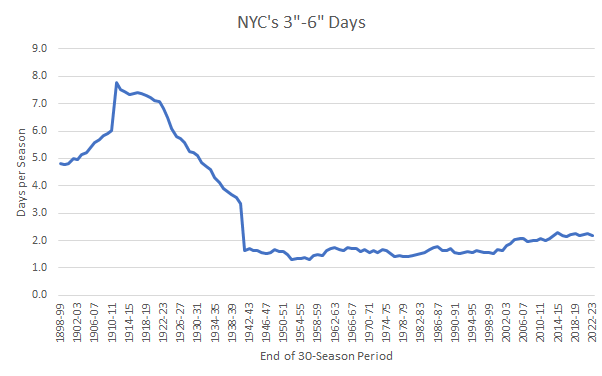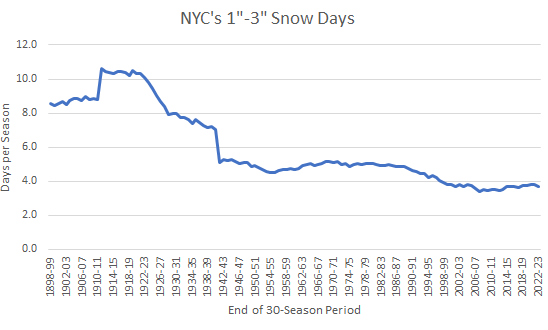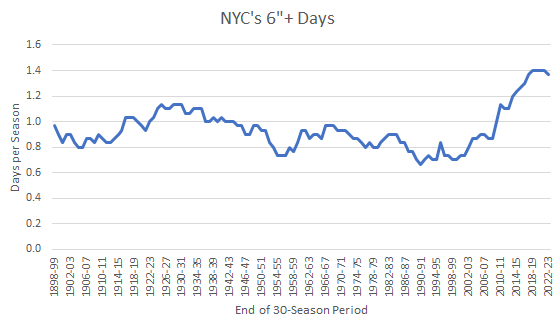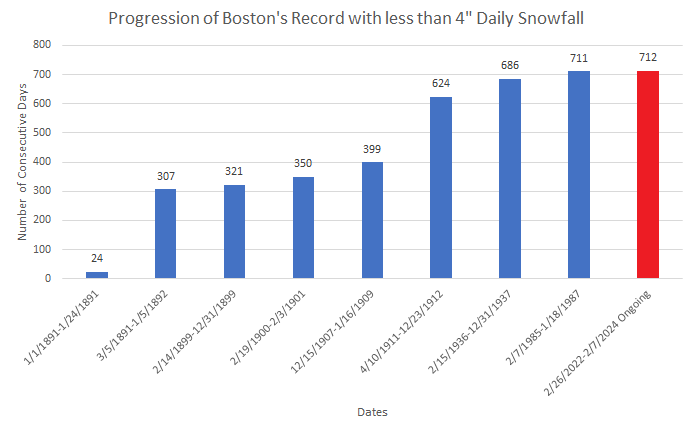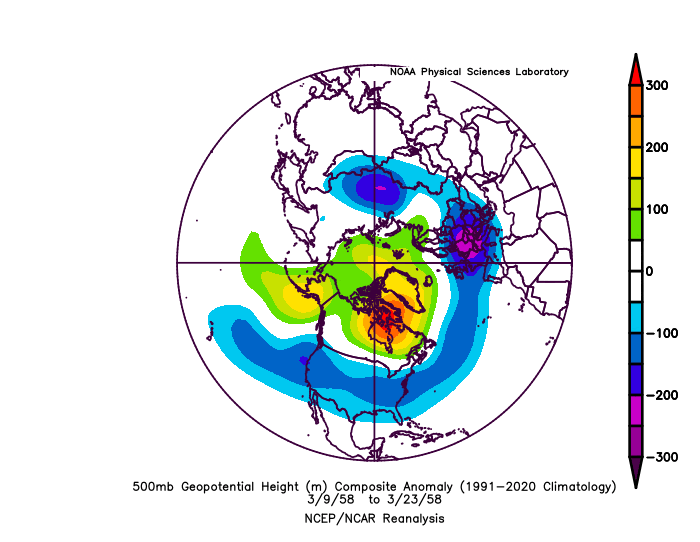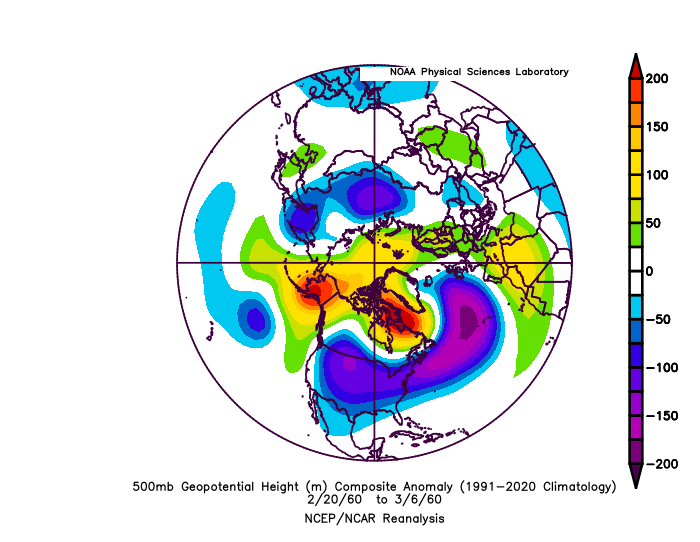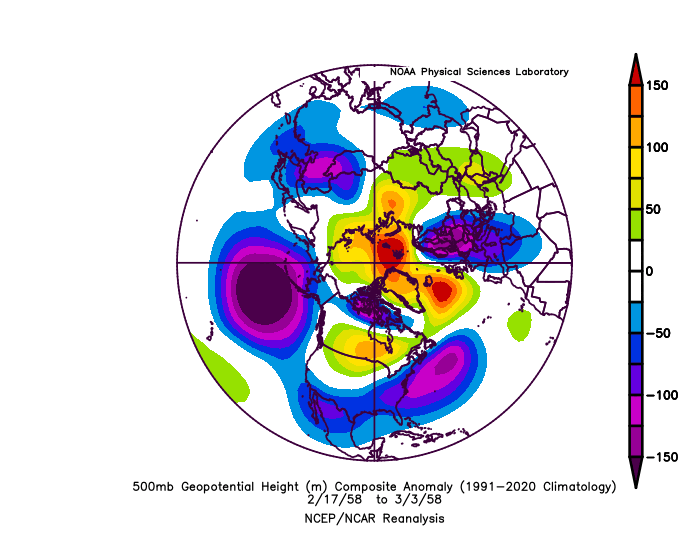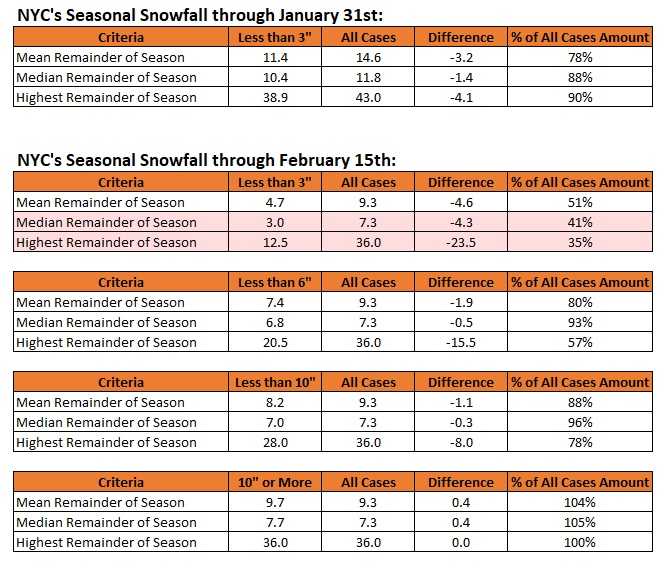-
Posts
22,983 -
Joined
Content Type
Profiles
Blogs
Forums
American Weather
Media Demo
Store
Gallery
Everything posted by donsutherland1
-
It's certainly plausible. I have greater confidence in the 30-season moving averages starting at 1980 and running through 2022-23.
-
I agree. I suspect that this development is an indication that the New York City area could be in the early stages of a transition toward a lower snowfall state due to the ongoing warming with the 30-season average falling to around 20" by the mid-2030s. A bad cycle may be amplifying the drop in snowfall.
-
The map could reflect the scenario where it could be snowing where precipitation is falling more heavily and raining elsewhere. While it's possible that the event could end as some wet snow in and around the NYC area and adjacent NJ, if the MOS forecasts are accurate, the ratios would be very low resulting in little or no accumulation (probably none in the City). This is yet another marginal air mass, at best.
-
NYC Statistics on the Number of Snow Events: Early Recorded Climate: 1869-1870 through 1898-1899: 1"-3" days: 8.5 per winter 6"+ days: 1.0 per winter More Recent Climate: 1961-1962 through 1990-1991: 1"-3" days: 4.7 per winter 6"+ days: 0.7 per winter 1991-1992 through 2020-2021: 1"-3" days: 3.8 per winter 6"+ days: 1.4 per winter
-

It was a Flop... February 2024 Disco. Thread
donsutherland1 replied to Prismshine Productions's topic in New England
Thank you for the kind words. The data was pulled from the xmACIS database. A graph was then constructed based on the data. -
A warming trend is now underway. The temperature could rise well into the 50s in New York City and into the 60s in Philadelphia and Washington, DC late in the week and early in the weekend. The generally mild conditions will likely continue into at least the second week of February with only brief interruptions. No Arctic air is likely to reach the area during this time. As a result, the first 10 days of February could wind up 5°-7° above normal in New York City. New York City will likely see a mean temperature of 40.0° or above during the February 1-10 period. Since 1869, there have been 9 prior cases. Five have occurred since 2000 and eight have occurred since 1990: 1952, 1990, 1991, 1999, 2005, 2008, 2012, 2016, and 2020. Seven of those nine years saw less than 10" snowfall for the remainder of the season following February 10th. Only one saw more than 20.0" (22.7", 2005). The least was the trace of snow that fell in 2020. The mean snowfall was 7.2" while the median snowfall was 6.0". In short, were the February 1-10 temperature to average 40.0° or above, that development could be a reinforcing signal for a below to much below normal snowfall season. The second week of February will likely see the evolution toward a sustained colder pattern begin late that week. A storm could affect the region early next week. There is a possibility that the rain could mix with or end as a period of wet snow or flurries in parts of the region. Single-digit cold is unlikely in New York City following the pattern change. During February, cases with warm ENSO Region 1+2 anomalies see such lows at 55% of frequency as cold ENSO Region 1+2 cases during El Niño winters. During the second half of February, just 17% of cases with a PDO- saw single-digit cold during El Niño winters. January saw a strongly negative PDO. The ENSO Region 1+2 anomaly was +1.0°C and the Region 3.4 anomaly was +1.8°C for the week centered around January 31. For the past six weeks, the ENSO Region 1+2 anomaly has averaged +0.87°C and the ENSO Region 3.4 anomaly has averaged +1.83°C. A basinwide El Niño event is ongoing. The ongoing El Niño event will continue to fade through much of February. The SOI was -39.05 today. The preliminary Arctic Oscillation (AO) was -1.342 today. On February 5 the MJO was in Phase 7 at an amplitude of 2.080 (RMM). The February 4-adjusted amplitude was 2.092 (RMM). Based on sensitivity analysis applied to the latest guidance, there is an implied 70% probability that New York City will have a warmer than normal February (1991-2020 normal). February will likely finish with a mean temperature near 38.0° (2.1° above normal).
-

It was a Flop... February 2024 Disco. Thread
donsutherland1 replied to Prismshine Productions's topic in New England
It’s unfortunate that measurements aren’t made at a location such as Boston Common. -

It was a Flop... February 2024 Disco. Thread
donsutherland1 replied to Prismshine Productions's topic in New England
That’s true, but it’s still a high profile location with lots of people. -
The number will be very high and there will likely be a high number of major hurricanes, some of which will probably make landfall. It’s tough to know right now where the highest risk of landfall might be.
-

It was a Flop... February 2024 Disco. Thread
donsutherland1 replied to Prismshine Productions's topic in New England
Hopefully, the snow drought will end soon. -

It was a Flop... February 2024 Disco. Thread
donsutherland1 replied to Prismshine Productions's topic in New England
Today will be Boston's 712th consecutive day without daily snowfall of 4" or more. That will surpass the record of 711 days that was set during February 7, 1985 through January 18, 1987 and tied during February 28, 2011 through February 7, 2013. -
This season has me really concerned. The combination of historic Atlantic Ocean warmth and an emergent La Niña is worrisome.
-
Certainly. As March 1958 was raised and part of that month saw similar teleconnections leading up to a big storm, here it is: Also, late February-March 1960: Notice no deep 500 mb low near the Aleutians nor an overpowering 500 mb low well off New England (more uniform trough depth).
-
Yes. But we won't have anything close to a HECS leading up to mid-month. Then, we'll have to wait perhaps for awhile. Late February-early March might afford the best opportunity. If there's going to be at least a moderate snowstorm, I suspect that it would occur within that window.
-
My concern this early on (and things should improve afterward) is that the above 500 mb chart is quite similar to a period that also was a "miss" as far as snowfall was concerned for the NYC and Philadelphia areas: February 17-March 3, 1958. New York City: Precipitation: 1.95"; Snow: 0.5" Philadelphia: Precipitation: 1.97"; Snow: Trace
-
JB is one of the three.
-
He's a PhD student at the University of Oklahoma and is really knowledgeable. His insights are consistently good. He puts accuracy ahead of making bold, splashy claims, the latter of which usually fail to materialize due to their nature as extreme outliers. IMO, he's a lot more credible than the 2-3 high profile accounts for whom seemingly all cold is epic, all snowstorms are legendary, and all events are extreme. Every cold pattern is not a repeat of 1985, 1994, or 2016. Every snowstorm is not a recurrence of the Blizzards of 1888 or 1978. Every 500 mb trough is not a recurrence of February 2010.
-
The clock continues to run when it comes to seasonal snowfall prospects. The below chart illustrates how things stood after January 31st and where things could stand after February 15th. That is historic data. Just as records can be broken, outcomes could diverge. But it makes sense to be grounded by the data until there is compelling evidence otherwise. On perhaps a more hopeful note, there have been 11 non-overlapping periods during February 15-March 15 (1950-2023) where the AO fell to -3 or below while the EPO and NAO were negative and the PNA was positive for two days or longer. For the time frame covered by those periods through 10 days following those periods the outcomes were as follows for New York City: Measurable snowfall: 82% of cases Daily snowfall of 1" or more: 73% of cases Daily snowfall of 4" or more: 55% of cases Daily snowfall of 6" or more: 45% of cases Worst period: March 9-22, 1970: Trace Best period: February 15-22, 2010 through March 4, 2010: 20.9" snowstorm (10"+ snowstorms also occurred in March 1958 and March 1960) It should also be noted that March 5-7, 1962 through March 17, 1962 was a "near miss" as a big cutoff low brought heavy snow to parts of the Middle Atlantic region while NYC saw only 0.2". February 13-14, 2024: In terms of the upcoming storm, the odds favor mainly or perhaps all rain for NYC. Any snow would likely be low- to very low-ratio wet snow given the forecast temperatures. Soundings will become important later as the event draws closer. February 15, 2024 and Beyond: A "battle" between historical outcomes and outcomes based on the forecast teleconnections could lie ahead. The historical outcomes would favor an increased likelihood of storms taking a more southerly route for a time resulting in perhaps higher snowfall in such cities as Baltimore and Washington than New York City or Boston. Then, as the block decays, storm tracks should shift northward. Whether that would happen in time for something notable remains to be seen. Overall Thinking: The cold period, which should run into at least the first week of March, will likely feature several light snow events and perhaps a moderate event (3"-4") for New York City. For now, until there is strong and sustained support on the guidance, historical experience with consideration for the forecast teleconnections is probably a reasonable approach.
-
The two-day figure was > 1 in 1,000 years. I don't have access to UCLA's older data, but the two-day figure was a record.
-
The final storm total at UCLA was 14.20". It was an unbelievable event.
-
A warming trend will get underway tomorrow The temperature could rise well into the 50s in New York City and into the 60s in Philadelphia and Washington, DC late in the week and early in the weekend. The generally mild conditions will likely continue into at least the second week of February with only brief interruptions. No Arctic air is likely to reach the area during this time. As a result, the first 10 days of February could wind up 5°-7° above normal in New York City. Potentially, New York City could wind up with a mean temperature of 40.0° or above during the February 1-10 period. Since 1869, there have been 9 prior cases. Five have occurred since 2000 and eight have occurred since 1990: 1952, 1990, 1991, 1999, 2005, 2008, 2012, 2016, and 2020. Seven of those nine years saw less than 10" snowfall for the remainder of the season following February 10th. Only one saw more than 20.0" (22.7", 2005). The least was the trace of snow that fell in 2020. The mean snowfall was 7.2" while the median snowfall was 6.0". In short, were the February 1-10 temperature to average 40.0° or above, that development could be a reinforcing signal for a below to much below normal snowfall season. The second week of February will likely see the evolution toward a sustained colder pattern begin late that week. Overall, February will likely wind up warmer than normal, even as the second half of the month could see a sustained period of colder weather. Single-digit cold is unlikely in New York City. During February, cases with warm ENSO Region 1+2 anomalies see such lows at 55% of frequency as cold ENSO Region 1+2 cases during El Niño winters. During the second half of February, just 17% of cases with a PDO- saw single-digit cold during El Niño winters. January saw a strongly negative PDO. The ENSO Region 1+2 anomaly was +1.0°C and the Region 3.4 anomaly was +1.8°C for the week centered around January 31. For the past six weeks, the ENSO Region 1+2 anomaly has averaged +0.87°C and the ENSO Region 3.4 anomaly has averaged +1.83°C. A basinwide El Niño event is ongoing. The ongoing El Niño event will continue to fade through much of February. The SOI was -41.69 today. The preliminary Arctic Oscillation (AO) was -1.040 today. On February 4 the MJO was in Phase 7 at an amplitude of 2.092 (RMM). The February 3-adjusted amplitude was 1.954 (RMM).
-
That was not a quality controlled number. The nearby station started reporting data on February 1, 2016, but didn’t report snowfall data. An earlier station in Hicksville stopped operating in 1938.
-
The highest figure for winter 2015-16 in the NYC region, including Long Island, was 42.2” at Middle Village 0.5 SW.


